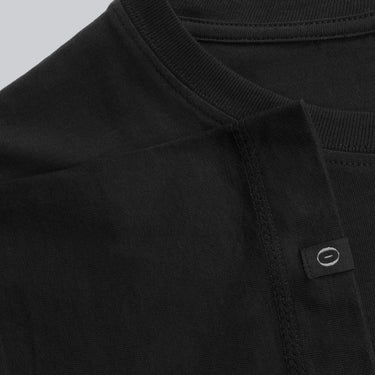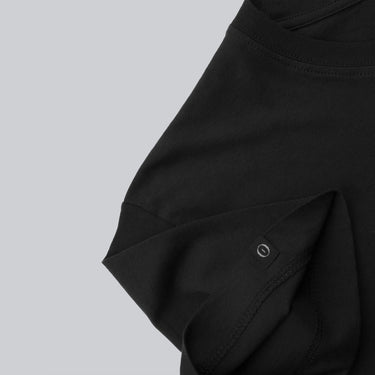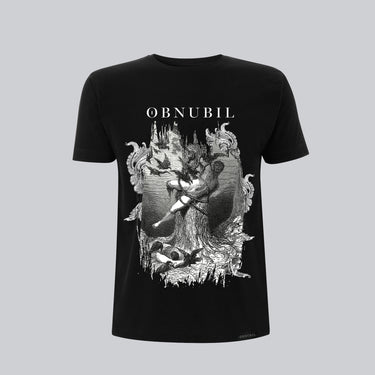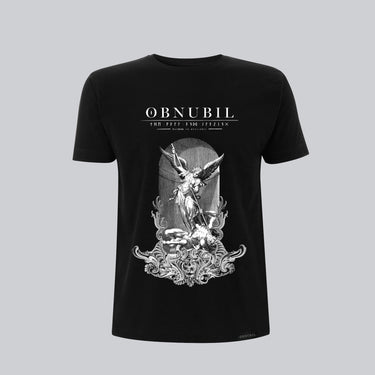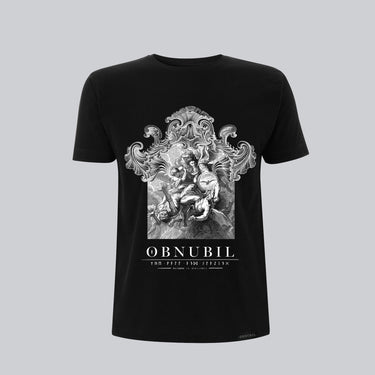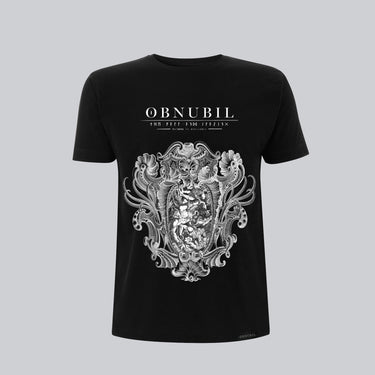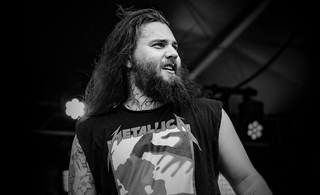
In the ever-evolving universe of extreme metal, few voices strike as many varied tones as Sindre Wathne Johnsen. Guitarist and vocalist across projects like Celestial Scourge, Deception, Blood Red Throne, and Todesking (among others), Sindre embodies an artistic restlessness—oscillating between brutal riffcraft, cosmic atmospheres, and emotional intensity. In my conversation with him, I trace the roots of his musical obsession, explore how he navigates multiple creative identities, and unpack the philosophy behind his songwriting. From his early inspirations in classic rock and guitar heroes to crafting death-metal soundscapes that grapple with existential themes and human psychology, Sindre shares a rare transparency about his process. Whether you're a longtime fan of any of his bands or simply curious how one mind can inhabit so many sonic worlds, this is a conversation worth diving into. Let’s welcome Sindre Wathne Johnsen!

INTERVIEW
OBNUBIL: Hi Sindre! First off, thank you so much for taking the time to chat with me. I’m really excited to dive into this conversation! Before we get into the music, I’d love to know how life is treating you these days. How have things been going for you, both personally and musically? Have there been any recent experiences or developments that are shaping your current outlook or creative direction?
Sindre: Hi! Thanks for having me! Life is pretty good at the moment. Personally I work for an ideal organization called Urban Hands where we offer activities for youth with focus on low-income families, refugees and minorities. For example we travel to youth clubs offering workshops, offer instrument lessons with the possibility of getting a scholarship, etc. We also have a street art festival called KANVAS which has been going very well. Musically it is pretty busy as always, with a new Blood Red Throne album announced, new Celestial Scourge in the works and slowly starting to develop the concept for a new Deception album.
If there are any recent experiences that are shaping the creative direction I’m not really sure, but I always try to look for inspiration in movies, series and music and have been enjoying a lot of eastern asian stuff. I think the new season of Squid Game was pretty enjoyable. It has a pretty interesting insight on the human mind in my opinion and that counts a lot more for me than more visceral stuff.
OBNUBIL: Your musical background likely plays a crucial role in shaping your sound and style. Could you take us back to the beginning of your journey? What initially sparked your interest in music, and how did that evolve into a full-fledged passion for becoming a musician? Were there any key moments or influences, whether personal or artistic, that inspired you to pursue this path as a career? I'd love to hear how those early experiences have contributed to the musician you are today.
Sindre: I grew up in a household where music was a big part of car trips and stuff, so I remember my first musical memory was driving to the mountains with my dad while listening to "Shine On You Crazy Diamond" by Pink Floyd. I vividly remember trying to improvise vocally over it while laying in the seat. Other than that we’ll have to go when I discovered Deep Purple. I think a friend of mine introduced me to them in the first grade and when I first heard the "Highway Star" solo, all I could think of was that I wanted to do that. It led to me buying my first CD (House of Blue Light - Deep Purple) and I would listen to that every day. I even made «shows» for my parents where I picked up a plastic guitar with a small speaker and used my bed for a stage. That went into "Made In Japan" also by Deep Purple (which btw is the objectively best live album of all time). So you could say Richie Blackmore sparked the initial thought of playing guitar. Later I got really into Guns n’ Roses, Aerosmith and AC/DC before I discovered Metallica, and that is where it all turned upside down. That band has a way of making people obsessed and I was dragged into it. My parents took me to a Metallica show in Copenhagen alongside Lamb of God and Mastodon in 2009 and that experience will stick with me forever. I didn’t want to listen to anything else before I got into Megadeth, and things got turned upside down once again. Getting into what Marty Friedman was doing was mind altering. Alongside Marty, Jason Becker quickly entered my life and those became my favorite players almost instantly, so I started learning their stuff (not successfully) and it helped me getting to where I am today. You know, sometimes there is music that resonates not only with the mind and feelings, but you feel it it your bones. That is what their stuff does for me. After that I started playing in a band and got introduced to death metal. Me and the drummer of Deception were listening to Dying Fetus and Cannibal Corpse in my basement. At first it was exciting and a bit terrifying, but after a while we started to really enjoy it. From there it has just expanded into all things death metal, lots of asian traditional music, K-Pop and instrumental guitar music.
OBNUBIL: You’re part of several projects that cover different spectrums of extreme metal—from the razor-sharp technicality in Deception to the apocalyptic atmospheres of Celestial Scourge, the brutal tradition of Blood Red Throne, and the blackened chaos of Todesking. When you switch between these bands creatively, is it like changing musical personalities, or is there a core ‘Sindre’ that remains untouched across all projects? Could you describe how your mindset or creative process shifts—or doesn’t—when writing or performing for each?
Sindre: I always have to take into consideration what project I’m writing for. There is of course some overlap between Celestial Scourge and Deception, but you can kind of tell where the riffs will fit the most. Celestial Scourge will focus on speed and brutality, while Deception is more focused on the emotional aspect of the mind. Not always happy or sad, but sometimes the more discarded feelings in music, such as disgust, feeling uneasy and apathy. For Blood Red Throne I only write lyrics, so here I try to keep some of my identity while still staying within the project themes kind of. Of course there will be a red line through everything I do, but I try as best I can to differentiate the general expression. With Todesking it’s a different beast altogether. I don't write too much, maybe a couple of songs here and there, but the musical mind of that project is the guitarist and the lyrics are mostly the other guys there.
OBNUBIL: Many metal guitarists aim to master precision, speed, and brutality—but few also manage to inject narrative or emotion into their playing. Listening to your work, one hears something that feels both violent and deliberate. Have you developed any personal philosophy about the purpose of the guitar in extreme metal? What does the guitar represent to you beyond technique and tone?
Sindre: As a person who grew up on ‘80s and ‘90s guitarists, I do think that the ‘feel’ aspect of guitar playing is often forgotten in the world of social media. That being said, when the music calls for a robotic feel one should be able to execute it. Therefore technique will always be a focus in my practice regime. The new trend of people hating on players that play fast doesn’t sit well with me. Playing fast is just as much a musical expression as playing one note (I’m looking at you Gilmour fans) and requires dedication, discipline and passion.
In my own work I try to blend both, combining tight runs with the phrasing and touch of the ‘80s. Good examples of guitarists that do that are Teemu Mantysäari, Brandon Ellis and Wes Hauch. They also don’t conform to only 16th notes or triplets. If a phrase calls for some uneven rhythmic patterns, they will do that. Think of it like getting from one point to the other in a certain amount of time without thinking about the divisions. There is also the way they think harmonically I really enjoy, going outside of the box and doing what most guys wouldn’t think of. Of course I don’t put myself up there with them, but that is the level I try to reach for.
OBNUBIL: Celestial Scourge has been described as “cosmic,” dealing with existential, often catastrophic themes. If we imagined that your riffs were actually fragments of alien messages or the dying signals of distant civilizations, what do you think they'd be trying to communicate? Have cosmic or philosophical themes actually shaped your writing, or are they the aesthetic filter applied afterward to something more primal?
Sindre: Hmm, not something I’ve thought about, but the main thing in the band is the inevitable destruction of mankind, so that is represented in the brutality of the riffs in my opinion. The cosmic horror thing was implemented before I joined the band, so I just try to morph some of my writing to it while still adding some of my own flair. What I think I’ve contributed the most within that band is general song structure and songwriting. I also take some inspiration from films such as Interstellar and Arrival for that more existential approach to the cosmic theme. That being said, we try to write music we want to listen to, combining dumb riffs with technical ones. It is a lot of fun not having any boundaries when it comes to that since we like both parts.
OBNUBIL: Being part of a legendary band like Blood Red Throne means stepping into a legacy while still maintaining your individual voice. How do you navigate the balance between honoring a band’s history and injecting fresh energy as a new(ish) member? Do you ever feel the pressure to conform to a legacy—or are you encouraged to challenge and expand it?
Sindre: That’s a great question. While performing the songs I’ve loved for years before I joined, I always try to do them justice. The previous vocalists of the band have been some of my main influences when it comes to sounding like I do, so I will always do my best to serve the songs. I don’t really feel the need to conform to the legacy. A lot of the earlier songs are super grotesque and I’ve never been very good at writing stuff like that, so I stick to my guns by developing concepts that revolve more around the human mind, state of the world and social commentary. I wouldn’t say I get political, but there might be something there. I was determined when the guys came knocking that I would for future releases do my own thing, because I think that is why I was asked to join.
OBNUBIL: Since Deception’s latest album, Daenacteh, was basically one of my most listened to albums of the summer of 2024—a record I absolutely loved—I’d like to ask you a few questions about it. If I am correct, “Daenacteh” tells the story of a young woman navigating a brutalitarian regime during a national crisis, set in a desert landscape. What inspired this narrative theme, and how did it influence your approach to guitar writing, orchestration, and dynamics? Also, compared to The Mire (2021), critics note that Daenacteh expands into more experimental passages, broader harmonic content, and symphonic layering. What drove this evolution—were you consciously pushing the band’s boundaries, or did the album’s storytelling demand a larger sonic canvas?
Sindre: Thank you! ‘Daenacteh’ is heavily inspired by Dune and World War Z. Iblis’ Mistress was written late at night after I had been watching World War Z and was stuck with this weird feeling in my gut that I needed to get out. The soundtrack of Dune is also a huge inspiration for this album. I adore Hans Zimmer and basically rode on his back for the inspiration for this. I was also tempted to get some female vocal chants on this album because of it (those who know), so I contacted Alia Fay to do it and she did a great job putting my vision to life. We will definitely be doing more of that.
What drove this evolution was simply getting better at orchestrating. Trying to reach the levels of Septicflesh, Fleshgod Apocalypse and Wintersun is always fun and I really enjoy the process of discovering the music while writing it. Sometimes things will align with something else and create a completely different thing and I think that is what makes it so layered, just experimenting and deciding what to keep. Deception is probably where I lay most of my heart when it comes to writing if that makes sense. It is where my love for film music, foreign cultures and metal all gets forged into one. It is probably why I find it harder to write for that project. Of course my heart goes into all of my projects, but in different ways. Deception hits more the spot that Marty Friedman and Jason Becker helped me discover, while Blood Red Throne and Celestial Scourge keeps my riff withdrawal in check. It doesn’t mean I like one project over the other though, it just hits different aspects of what I enjoy.
OBNUBIL: The sequencing—from the riveting opener “Sulphur Clouds” through hook-driven mid-album songs like “King of Salvation,” to the eleven-minute closer “Daughters of the Desert”—creates a distinct arc. How did you conceive this narrative flow, and what role did guitar interplay have in guiding the listener through each phase? What challenges did you face in writing and performing such an extended piece like “Daughters of the Desert”, and how did you maintain cohesion while exploring so many musical layers?
Sindre: In the beginning it was just to write something that we really liked and then when we kind of figured out the direction the music was going, we started to work on the concept. Me and Hansi then one night having a few beers, started developing the skeleton of the story that I later added onto and refined before writing the lyrics. For me, the best thing to go about this is to first write the songs, find the correct order for them to be in and then start writing the lyrics. That way we can keep the story «linear».
I’ve always liked longer songs that take you on a journey, so that is why we’ve included that in our latest albums. The difficult part about it is knowing that you could end the song after a specific part, but still trying to find a way to keep going without it becoming too much. It is a risk I like to take, but I understand that it can be a bit too much for people. Performing it is so much fun, when you get all the layers of the orchestration straight into your ears while playing it knowing how much work went into it. It’s not more challenging than learning 2-3 songs in my opinion. You just gotta repeat it over and over.
OBNUBIL: Now that Daenacteh has been out for over a year, how do you look back on it: as a culmination of what Deception wanted to express, or as a stepping stone toward something unexpected—and if so, what new directions are stirring in your mind?
Sindre: It is to date probably my most proud work because it is such a huge project and the most personal piece I’ve written. I would like to build even more on it with different themes and instrumentation. To be honest I haven’t really been able to write much for Deception since it came out because of the expectations I have for myself going into it. It has gotten to a point now where I’m ready to start writing again and it is shaping up differently, but still keeping the essence of what me and the others want Deception to be. New for this next one would be going over to a 7-string guitar and tuning really low for some parts. It is sounding MASSIVE.
OBNUBIL: Tell me about your relationship with dissonance. In bands like Todesking and Celestial Scourge, it seems like you’re not just tolerating dissonance—you’re seducing it, using it as a textural force. When you're composing a riff or layering parts, how do you decide whether something should sound “wrong” in a way that feels absolutely right for the atmosphere?
Sindre: Well, it is all about context, right? Dissonance for me is a crucial tool to making music that speaks. It is the same with not only feeling happy or sad, but sometimes feeling uneasy, restless and disgusted. A beautiful part will hit even harder when contrasted with something from the other side of the spectrum. So for me, this tension and release is the reason I like most of the music I like and for me is a rewarding way to write. Knowing the rules allows you to break them and I love that approach.
OBNUBIL: Norwegian metal has a distinct historical weight to it—especially in the realm of black and death metal. But you're part of a generation that's pushing forward, building on that without being imprisoned by it. As a guitarist from Norway, do you ever consciously reflect on what it means to “sound Norwegian” in 2025, or is your musical identity more shaped by global influences, personal instinct, or even defiance of that national expectation?
Sindre: No, not really. Norwegian metal has always been an inspiration for my own songwriting, especially Blood Red Throne, but I’m not really concerned about sounding Norwegian since most of my influences come from abroad. It might even be defiance of expectation as you put it. Other Norwegian bands that I draw inspiration from are Kvelertak, Purified In Blood and Dimmu Borgir, but I don’t really feel like the impact they have on the music I write is too big compared to all the other stuff.
OBNUBIL: Some artists describe creating music as a form of ritual, even if they don’t view it in spiritual terms. With the kind of dark, aggressive, and layered music you’re part of, is there a ritualistic aspect to your creative or performance process? Do you have pre-show habits, compositional rules, or mental shifts that prepare you to enter that musical space?
Sindre: There is not really a form of ritual to it. I am fortunately in the position where I still can make music when I want to, not when I have to. To be able to perform my best, I need to be inspired, so if I’m not inspired for some months, then I’ll have to do something else basically. It might explain why it takes quite a while for stuff to be finished, but I wouldn’t want it to be any other way.
For live performances I usually take a look at the backdrop and go through what will happen before the curtain falls. Before that, a beer is much appreciated and some pushups to get the blood flowing. In general, the mental switch is about the same whenever I’m gonna perform.
OBNUBIL: Looking at your career so far, you’re clearly not someone who limits himself to one path or aesthetic. What do you think has drawn you to the darker corners of metal across multiple bands? Is there a recurring emotional or existential theme that drives you—something you’re trying to express or exorcise through all these different sonic languages?
Sindre: It's mostly because I love each of these different parts of the genre and don’t really feel like they would mix quite well. Or at least, if I want to do it, I want to do it as I’ve imagined in my head, and for that to work I need to separate the projects you know. But also, it is the possibility to play with different people and get different inputs for what gets written. That is something I appreciate a lot, since the people I play in bands with, I consider my best friends.
A recurring theme that drives me is inequality, injustice and diving into what drives the human mind to an atrocious state. It will most likely be hidden behind some metaphor or story, but that’s the main thing I like to shed light on.
OBNUBIL: Imagine each of your bands—Celestial Scourge, Deception, Blood Red Throne, and Todesking—was represented by a mythical creature. What would each creature be, what would they sound like when they scream, and which one would win in a cosmic battle of riffs?
Sindre: Off, I’m not too well versed in mythical creatures, so I’ll do it with animals instead if that is fine, haha:
-
-
-
- Blood Red Throne - Bear, powerful creature that kind of goes along with the groove of the forest and hits hard.
- Deception - Tiger, beautiful when calm, but something relentless when provoked.
- Celestial Scourge - Komodo dragon, venomous slashing bite and the apex predator of the ecosystem.
- Todesking - Tasmanian devil, ferocious with a loud and disturbing screech.
-
-
In a riff battle it would depend on the arena and context haha. That being said I think all the bands have different qualities when it comes to the riffs. Blood Red Throne is more about the groove and songwriting, Celestial Scourge is more aggressive and chaotic, Deception more refined and precise, Todesking more primal.
OBNUBIL: If you could insert one of your riffs into a famous film scene—say, the ending of 2001: A Space Odyssey or a Viking funeral pyre slowly drifting into the mist—which riff would you choose, from which band, and what effect do you think it would have on the audience's perception of that scene?
Sindre: Hmm, I would love to see a Deception riff from Daenacteh in the Dune movies since that is where the inspiration lies. Looking aside from that, I would love to see one of the more intense Celestial Scourge riffs in a John Wick fight scene. I think it would make the fight quite tense.
That being said I would love to score for a movie or a game sometime. It is definitely on my bucket list and has to be something dramatic though, since that is where my strong suit is.
OBNUBIL: What’s on the horizon for you musically? Are there any upcoming albums, new genres, projects, shows or collaborations you’re especially eager to dive into? What can we look forward to from you in the near future?
Sindre: Well, Blood Red Throne just announced a new album, so you can expect some singles and an album going forward. 5th of December is the date!. Celestial Scourge is well underway as well on that front and Deception has started gathering ideas for a new concept. For shows, we have some unannounced stuff coming, exciting stuff!
OBNUBIL: It’s been a pleasure being able to ask you a few questions and learning more about your journey! Thank you for taking the time to answer these questions. Is there anything you’d like to share with the readers and your fans?
Sindre: Thank you very much for having me, it has been great! Life is short, focus on what you love, come say hi and grab a beer!
Interview done September 2025. Cover photo by Seth Abrikoos.



